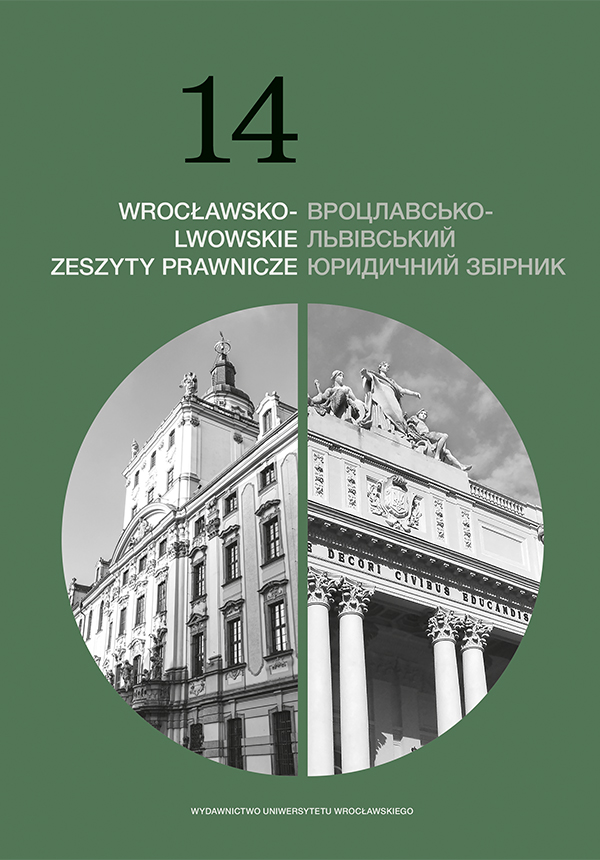Wpływ prawa rzymskiego na kształtowanie się wybranych instytucji prawa ukraińskiego — uwagi na marginesie art. 291 k.p.k.
The influence of roman law on the shape of selected institutions of ukrainian law — marginal notes regarding the 291st article of the penal code
Author(s): Wojciech Jan KosiorSubject(s): Law, Constitution, Jurisprudence, History of Law, Roman law
Published by: Wydawnictwo Uniwersytetu Wrocławskiego
Keywords: Roman law; Ukrainian law; Code of Criminal Procedure; indictment; complaint; prosecutor
Summary/Abstract: The article analyses Roman influences on Ukrainian criminal proceedings focusing on the institution of an indictment, which marks the conclusion of the initial stage of the proceedings by accumulating evidence of a person’s perpetration and guilt. The impetus for undertaking such research stems from similar considerations regarding the influence of Roman law on the construction of the Polish indictment. An indictment is a specific procedural document and thus strictly formalised. It should meet the European standards referred to in Article 6 of the European Convention on Human Rights and Fundamental Freedoms. This provision mandates that the accused be provided with intelligible information about the nature and cause of the accusation against them, as this provision, among other things, requires that the accused be provided with intelligible information about the nature and cause of the accusation against him. In the case of Ukraine, the requirements for indictment are stipulated in Article 291 of the Code of Criminal Procedure. The purpose of this article is to discuss the Roman roots of the Ukrainian indictment and, more specifically, the influence which Roman solutions, adopted in the opinion of Paulus in D. text. 48, 2, 3, exerted on the content of Article 291 of the Code of Criminal Procedure. Apart from a mere comparison of the content of the ancient transmission with the current provision, the article attempts to demonstrate the precise Roman roots of this institution through a thorough analysis spanning from ancient law, medieval law, modern law and up to modern solutions. As a result of comparing the content of these provisions, it was possible to see that the modern indictment of Ukraine refers to the structure developed in Roman law. However, ancient influences are not only evident in the comparison of the indictment’s structure itself. The mere external resemblance is insufficient to conclude that modern indictments have Roman origins. For years, Ukraine employed an indictment based on the French model, which no longer demonstrated such links with recycled Romanian law. It was only in 2012, when the new Code of Criminal Procedure and the codification commission’s use of was enacted, drafting its principles used the Germanic model of the accusatory complaint, that the indictment described in Article 291 can be said to be based on solutions that were developed under the influence of Roman law. The research carried out, the results of which are presented in this article, is part of the current research devoted to the foundations of Ukrainian law, with particular emphasis on Roman influence. The research aims to demonstrate that, despite the enormous influence of Russian, and later Soviet, legal solutions, Ukrainian law (basically newly reshaped since 1991) is part of the trends of European legal culture as a result of the implementation of Western solutions.
Journal: Wrocławsko-Lwowskie Zeszyty Prawnicze
- Issue Year: 14/2023
- Issue No: 1
- Page Range: 95-113
- Page Count: 20
- Language: Polish

